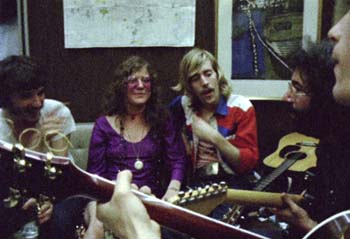
In the summer of 1970, rock promoters Ken Walker and Thor Eaton organized a traveling music festival that made its way across Canada in a train that was dubbed the Festival Express. The train occasionally stopped for concerts, but for the musicians onboard, including The Grateful Dead, Janis Joplin, and The Band, the journey itself was as much fun as each of the stops.
Filmmaker Bob Smeaton says that when he recently told one of the musicians about the plans to make a film about the historic tour, he replied, "Great! But what are you gonna use for footage?" To which Smeaton replied, "There were cameras on the train," and the guy said, "There were?" There were, indeed, cameras and tape recorders on the train, but they were so unobtrusive and the spirit so festive that they were hardly noticed.
A festive spirit is exactly what Walker and Eaton were going for, believing that the best way to have great shows was to keep the musicians happy, so they filled the train with free food and booze and even made an impromptu stop in Saskatoon when supplies were running low. One car of the train was dedicated to non-stop jamming, and jam is exactly what the travelers did.
Smeaton has assembled a fun and intimate look at musicians doing what they love, playing music and feeding off of each other's creativity, and like the train that his film documents, he never swerves away from the music and camaraderie. He only pauses here and there to touch on the external forces that could have derailed the tour or the film. Joplin died only two months after the trip, and in the same year many of the bands began to realize the difficulty of remaining at this juncture of culture and commerce. At one stop, fans who objected to the show's $14 price tag tried to crash the party, which frustrated some of the musicians who thought it was a fair price for a day's worth of great music. True to form, Jerry Garcia calmed the angry crowd, and the Dead performed a free set in a nearby park.
The promoters lost a bundle on the venture. Smeaton tells that tale, and he nods to the events that marked the symbolic end of the 1960s, but before getting too far off track he always comes back to the music, which includes "The Weight" by The Band, several songs from the Dead, and no-holds-barred performances of "Cry Baby" and "Tell Mama" by Janis Joplin that bring down the house. The low-key noodling on the train is just as enjoyable as some of the stage performances. The duets between Garcia and Joplin and the late-night jams of Garcia and Buddy Guy show these folks at their most relaxed, enjoying every minute of a ride that came to feel like an oasis in a hectic world.
It all looks effortless, which given the circumstances is quite a feat. The footage shot on the train was scattered around Canada for years, and it was never properly synced with the sound recordings, so gathering the negatives and recordings in one place was merely the first step toward assembling a model train engine that had no instructions. Each concert yielded an audio recording and hours of film from multiple cameras — and that doesn't count the round-the-clock jamming on the train — but few notes existed that might help an editor link a particular audio recording to its related film, so just putting sound with the pictures was a painstaking process. It's amazing that it all looks and sounds so good.
Smeaton retains the grainy appearance of the 16mm film, which has been blown up to 35mm but is otherwise unprocessed, aside from a de rigueur split screen here and there. In some spots the limited selection shows. The Flying Burrito Brothers, for instance, appear without front-man Gram Parsons, and although Buddy Guy launches into a searing version of "Money" he disappears before the end of the song, and his band, finally deciding that he's not coming back to the stage, winds it up without him. It also would be nice to see more footage from the train, but cameramen, unlike musicians, need their sleep.
Still, Festival Express includes enough high points to make the trip worth taking. We're lucky to have this material at all, even with a few rough edges. It's impossible to imagine present-day musicians of this stature being so candid on film and so open to close observation. It was the right time and right place, and even the people onboard seem to know it. Thanking Walker and Eaton onstage, Joplin says, "The next time you throw a train, invite me, man." But it wasn't to be.
